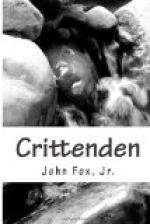“That’s the way you’ll find it all through the army. Each colonel and each captain is always the best to the soldier, and, by the way,” he went on, “do you happen to know about this little United States regular army?”
“Not much.”
“I thought so. Germany knows a good deal—England, France, Prussia, Russia—everybody knows but the American and the Spaniard. Just look at these men. They’re young, strong, intelligent—bully, good Americans. It’s an army of picked men—picked for heart, body, and brain. Almost each man is an athlete. It is the finest body of men on God Almighty’s earth to-day, and everybody on earth but the American and the Spaniard knows it. And how this nation has treated them. Think of that miserable Congress—” Grafton waved his hands in impotent rage and ceased—Rivers was calling them from the top of the hill.
So all morning Crittenden watched the regimental unit at work. He took a sabre lesson from the old Sergeant. He visited camps of infantry and artillery and, late that afternoon, he sat on a little wooded hill, where stood four draped, ghost-like statues—watching these units paint pictures on a bigger canvas below him, of the army at work as a whole.
Every green interspace below was thickly dotted with tents and rising spirals of faint smoke; every little plain was filled with soldiers, at drill. Behind him wheeled cannon and caisson and men and horses, splashed with prophetic drops of red, wheeling at a gallop, halting, unlimbering, loading, and firing imaginary shells at imaginary Spaniards—limbering and off with a flash of metal, wheel-spoke and crimson trappings at a gallop again; in the plain below were regiments of infantry, deploying in skirmish-line, advancing by rushes; beyond them sharpshooters were at target practice, and little bands of recruits and awkward squads were everywhere. In front, rose cloud after cloud of dust, and, under them, surged cloud after cloud of troopers at mounted drill, all making ready for the soldier’s work—to kill with mercy and die without complaint. What a picture—what a picture! And what a rich earnest of the sleeping might of the nation behind it all. Just under him was going an “escort of the standard,” which he could plainly see. Across the long drill-ground the regiment—it was Rivers’s regiment—stood, a solid mass of silent, living statues, and it was a brave sight that came now—that flash of sabres along the long length of the drill-field, like one leaping horizontal flame. It was a regimental acknowledgment of the honour of presentation to the standard, and Crittenden raised his hat gravely in recognition of the same honour, little dreaming that he was soon to follow that standard up a certain Cuban hill.
What a picture!




